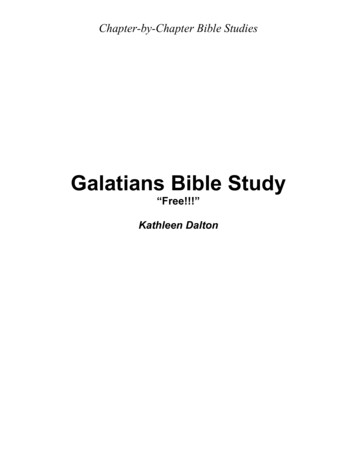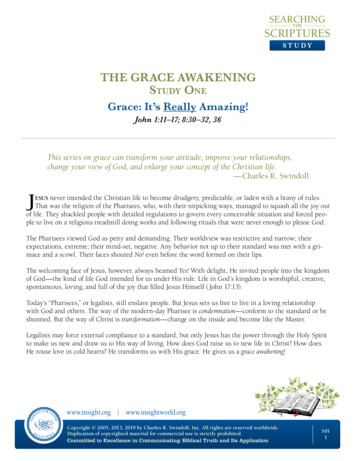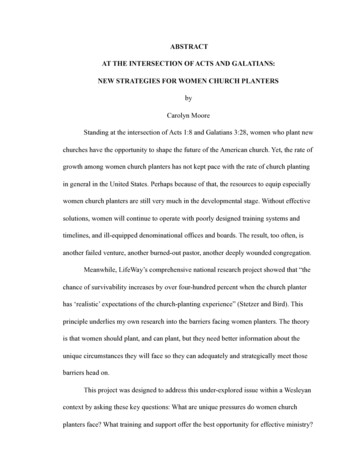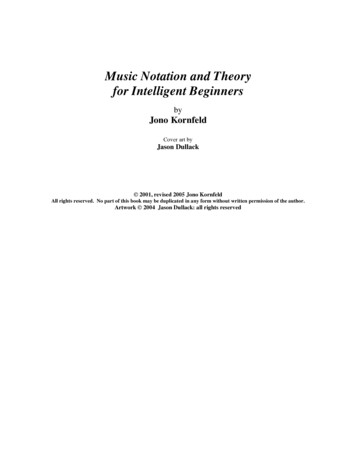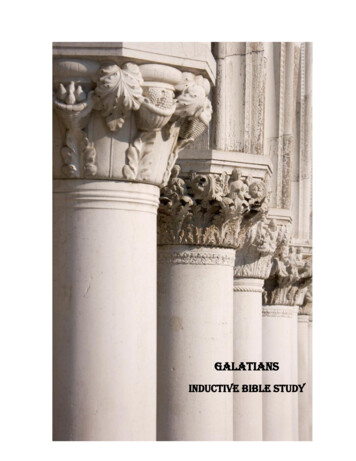
Transcription
GalatiansInductive bible study
Week12345678910111213Passage: GalatiansIntroductory -204:21-315:1-155:16-266:1-18SummaryAndrew Hancock2009I am grateful to Grace Bible Church in College Station, Texas for the some of the introductorymaterial in the first five chapters
Galatians introductionSurveyRead the entire book of Galatians and also the introductory articles. Use thosereadings to help you fill in the charts.Introductory ArticleThe letter to the Galatians deals directly with the most basic theological question faced bythe first Christian generation: How does the gospel of Jesus Christ affect theJewish/Gentile division? The first Christians were Jewish, and at the beginning it wasassumed by them that the special character of their nation, and thus the ceremonialobservances related to it, would be continued. When Gentiles began to receive the gospelin significant numbers, those assumptions were challenged, and it took a prolongedperiod of reflection, adjustment and struggle to understand God‘s purposes for Jew andGentile.No document is more important to uncover those struggles than Paul‘s letter to thechurches of Galatia. The Christians in that area had become the object of intensemissionary zeal by certain ‗Judaizers‘ who were convinced that the gospel did not setaside the Jewish ceremonies and that, therefore, the Gentile Christians must become Jewsif they were to receive God‘s promise given to Abraham. (Originally the Greek word ‗toJudaize‘ was used to describe the adoption of Jewish ways by Gentile converts toJudaism.) Moved by the Judaizing arguments, these Galatians, who had initially beenevangelized by Paul, began to observe the Jewish ceremonies. The apostle realized thatsuch a turn of events undermined the very essence of the gospel of grace. His letter tothem reveals Paul‘s deepest convictions.As he develops his arguments in response to the teaching of the Judaizers, the apostletouches on a variety of fundamental questions, such as the nature of apostolic authority,justification by faith, the Abrahamic promise, sonship, the role of the law of Moses,freedom, the work of the Holy Spirit and sanctification. It is not surprising that this letterhas played a major role throughout the history of the church, most notably at the time ofthe Reformation in the sixteenth century, when Martin Luther leaned heavily onGalatians to attack the Roman Catholic doctrine of salvation. While the precise focus ofcontroversy between Paul and his opponents—should the Gentiles be circumcised?—mayappear to be a distant concern to most Christians after the first century, the central issue isnothing less than the basis of our relationship to God. The answer given by the Judaizers,on the surface, called attention to the Jewish ceremonies, but their deeper commitment—dependence on ‗the flesh‘ rather than the Spirit—can find expression in many other ways.It is claimed by some modern scholars that this so-called Protestant understanding ofGalatians is invalid. However, although Martin Luther and the other Reformers may havemissed certain nuances, they were not mistaken to see in this letter God‘s answer to theissues of that day. Whatever else Galatians teaches, it certainly tells us in clear andvigorous language that our right standing before God can only be an act of grace received
through faith in Christ. No church rituals and no human efforts can establish ourjustification. On the contrary, ‗The righteous will live by faith‘ ( 3:11 ).Historical settingWith regard to certain historical questions surrounding Galatians, there is very littledoubt. Few scholars seriously question, for example, that Paul was the author. Again, thetext makes it quite clear that certain individuals were creating spiritual sedition in theGalatian community by preaching a false gospel that pressured the Gentile believers toobserve Jewish ceremonies, particularly circumcision ( 1:7–9 ; 5:2–3 , 7–12 ; 6:12–13 ).On the other hand, considerable debate exists regarding the date, the recipients, and theprecise occasion for the writing of this important letter.Many scholars today identify the recipients of this letter as the churches founded byPaul and Barnabas in Iconium, Lystra and Derbe ( Acts 14:1–23 ). They were located inthe southern part of the Roman province of Galatia, in the interior of Asia Minor (modernTurkey). The name of this province comes from a region to the north, where the race ofGalatians (originally from Gaul) had settled, and a minority opinion holds that the
churches in question were located in this area—an opinion that affects the dating of theletter. Appeal is made to Acts 16:6 in support of the view that Paul founded somechurches there, but this text is at best ambiguous, and other evidence is not strong.A more complicated but related question has to do with the dating of the letter. Thebasic point of the debate is whether Paul wrote Galatians before or after the so-calledApostolic Council in Jerusalem. This event, recorded in Acts 15 , is dated by mostscholars in AD 49 (certainly no earlier than 48). Paul apparently refers to this council inGal. 2:1–10 , but many have argued that his description conflicts with the Acts narrative,especially since he fails to mention the decree reported in Acts 15:22–29 .Some scholars avoid the problem by arguing that Galatians was written before thecouncil. (This argument assumes that the letter was written to churches in the southernpart of the province. The view that the churches in question were located to the northprohibits this dating, since Paul did not evangelize the northern region until after thecouncil.) According to this early dating, Gal. 2 does not conflict with Acts for the simplereason that at the time of writing this letter the council had not yet taken place. Paul‘scomments, therefore, must refer to a different meeting (probably the one described inActs 11:29–30 ). To other scholars this solution appears too easy, especially in view ofthe strong similarities between Acts 15 and Gal. 2 . It is possible to argue that bothpassages refer to the same event and that the differences can be accounted for byrecognizing the very different perspectives of the two authors. According to this view,Galatians must have been written after AD 49, and the preferred date is in the mid-fifties,while Paul was in Ephesus during his third missionary journey.The controversy about the date of Galatians is not a mere scholarly game. Certainsubtleties about the meaning of the letter—to say nothing about larger questionsregarding the history of the early church—are indeed affected by one‘s view of itsrelationship to the Jerusalem council. The present commentary assumes Galatians waswritten in the mid-fifties. Nevertheless, since it is not possible to achieve certainty on thequestion, it would be unwise to interpret the letter in a way that depends heavily on howit is dated. In particular, an effort must be made not to give key explanations that wouldbe rendered invalid by the adoption of an alternate historical setting. Fortunately, theprimary thrust of Paul‘s argument is clear enough and does not revolve around our abilityto identify the setting with precision.Purpose and structureWhat then is Paul‘s argument? The apostle is very explicit when he states that he wasmoved to write the letter because the Galatians were in the process of deserting thegospel ( 1:6–7 ). They had, in fact, returned to ritualistic practices reminiscent of theirearlier pagan experience ( 4:9–10 ).Because the individuals who were causing problems in Galatia appear to haveundermined Paul‘s authority, the apostle devotes the first major section of the letter todefending the divine origin of his gospel (chs. 1–2 ; see especially 1:1 , 11–12 ; 2:6–9 ).
In the next two chapters, appealing to the OT itself, he demonstrates that God‘s promiseto Abraham is received, not by the works of the law, but through faith (3:6–14 ). Finally,he finds it necessary, in chs. 5–6 , to spell out the practical implications of this gospel offreedom (see especially 5:13–26 ). These three concerns, however, are subservient to hisone great purpose: preventing the Galatians from abandoning the gospel of truth andbecoming apostates.The threefold structure just outlined reflects a common and traditional way of readingGalatians. Recent studies, without necessarily discarding this basic perspective, haveattempted to define more precisely the literary character of the letter by examiningrhetorical techniques in antiquity. Some scholars view Galatians as an ‗apologetic‘discourse (something like a judicial defence), while others view it as a ‗deliberative‘piece (intended to persuade an audience to do something). Another perspective, focusingmore on the structure of letters rather than on speeches, sees Galatians as consisting oftwo main parts, a rebuke section ( 1:6–4:11 ) and a request section ( 4:12–6:10 ).Additional suggestions have been proposed by specialists in this field, and theinsights of sociological and anthropological research make further contributions to ourunderstanding of the way Paul constructs his arguments. Since a consensus has not beenreached on these matters, the present commentary uses a fairly traditional outline toindicate the structure of the apostle‘s logic. Whatever the precise literary pattern that mayhave influenced Paul‘s writing, it is of great importance to interpret each verse or passagein the context of that logic.From Bible Knowledge CommentaryGalatians Survey ChartPurpose(s) of the letterAuthor (Characteristics we see in Galatians)Date:
Characteristics of the GalatiansKey VersesMain Ideas/repeated themesJot down anything else from the introductory articles that you find significant
Book OutlineSkim Galatians and come up with a short summary phrase for each paragraph (don‘t usea translation that already has headings on paragraphs). Write in chart 04:21-315:1-155:16-266:1-18
Galatians 1:1-10ObservationsMaterial from Grace Bible ChurchObservation is the most important element in inductive Bible study. It is like thefoundation of a house. When the foundation is well-laid, the house can be constructedwith confidence. Likewise, if we observe thoroughly, our next step, interpretation, willfollow naturally and accurately. Our wise predecessor Solomon has instructed us, ―It isthe glory of God to conceal a matter, but the glory of kings is to search out a matter.‖(Proverbs 25:2) The treasures of God‘s wisdom await our discovery - a discovery whichcomes only through diligent, active searching.―[I pray] that the God of our Lord Jesus Christ, the Father of glory, may give to you a spirit ofwisdom and of revelation in the knowledge of Him. I pray that the eyes of your heart may beenlightened, so that you may know what is the hope of His calling, what are the riches of theglory of His inheritance in the saints, and what is the surpassing greatness of His power towardus who believe.‖ (Ephesians 1:17-19)Here are some general guidelines to keep in mind before you begin yourobservations. First, our time for study of His Word must be given a place of priority.We must devote to it the time of day we are most alert, rather than relegating it to theposition of well-intentioned afterthought. Second, we must learn to see again. We muststretch our minds as if we were pursuing the most important prize in the world because,in fact, we are. Don‘t overlook anything. Record everything. Nothing is too trivial to beobserved. It is the trivial observation which often spurs the mind to apprehend deepertruth. Third, it is God‘s desire to reveal Himself to you, not to hide Himself. Approachthe Word expectantly, dependently and obediently. God is able and willing to disclose toyou the profound mysteries of His Word, but He is not in the habit of revealing His willto the curious. Remember, as our Lord Himself explained, ―He who has Mycommandments and keeps them, he it is who loves Me; and he who loves Me shall beloved by My Father, and I will love him, and will disclose Myself to him.‖ (John 14:21)Now let‘s go over the basic techniques for making great observations.What should you look for within a passage?A. The Basic Questions:a.o Who – Who is performing or receiving the action of the sentence or paragraph?b.o What – What is occurring?c.o When – When is it occurring? Is there a sequence of events?d.o Where – Where is the action occurring? Does the location change within theparagraph?e.o Why – What is the goal or purpose for the action? Who benefits? What ishis/her motivation?f.o How – What is the means or manner for accomplishing the action?B. Key Words (especially theologically important terms)
C. Important Connectives - Indicate the relationships within and between clauses andparagraphsa.oTemporal - after, then, as, until, before, when, now, whileb.oLocal or geographical - wherec.oLogical – read next two pages entitled ―Structural Indicators‖d.oEmphatic - indeed, onlyD. Grammatical Construction - How does each word function in the sentence?oVerb - creates the ―action‖ or state of being. Note the tense of the verb (when is the action being performed). Note the ―voice‖ of the verb (active - the subject is doing the acting;passive - the subject is being acted upon)b.oNoun - name of a person, place, thing or qualityc.oPronoun - used in the place of a nound.oAdjective - modifies or describes a noune.oAdverb - modifies a verb, adjective or other adverbE. Figures of speech - Non-literal language (e.g. ―I am the bread of lifeF. Context of the preceding and following passagea.oHow is this passage related to the previous and following passages?b.oWhat connecting words are used between the passages?c.oDoes the audience, mood, or subject change between the passages?G. Things that are missing – what is not included in a passage can be just as importantas what is!o What words, phrases, or ideas does the author not include that you would haveexpected?
DIG INSpace to write observations, circle define keywords, cross-references, etc.Paul, an apostle- not from men northrough man, but through Jesus Christ andGod the Father, who raised him from thedead- 2 and all the brothers who are withme, To the churches of Galatia: 3 Grace toyou and peace from God our Father andthe Lord Jesus Christ, 4 who gave himselffor our sins to deliver us from the presentevil age, according to the will of our Godand Father, 5 to whom be the gloryforever and ever. Amen. 6 I am astonishedthat you are so quickly deserting him whocalled you in the grace of Christ and areturning to a different gospel- 7 not thatthere is another one, but there are somewho trouble you and want to distort thegospel of Christ. 8 But even if we or anangel from heaven should preach to you agospel contrary to the one we preached toyou, let him be accursed. 9 As we havesaid before, so now I say again: If anyoneis preaching to you a gospel contrary tothe one you received, let him be accursed.10For am I now seeking the approval ofman, or of God? Or am I trying to pleaseman? If I were still trying to please man, Iwould not be a servant of Christ.
INTERPRETATION (Use space below to write out and answer some of the questions you have aboutthe passage also write out other things you decided to study).SUMMARY(Make a chart, drawing, list, or write 1-2 sentence summary statement)
BIG IDEA(Theme of the passage in 3-5 words)PRINCIPLES(Universal statements of truth derived from passage)APPLICATIONS(Specific steps of action)
Galatians 1:11-24QuestionsInterpretive QuestionsUse the chart below to assist you when you go about writing your questions of the text.Material from Grace Bible ChurchComponentsTermsDefinitive (What?)Rational (Why? How?)What key words require word study? What is themeaning of the term ? How does it functionin this sentence?What verb tenses are used?Why was this word (or verb tense) used here?What other word might have been used, and whywas it not?Why does the author change terms? Is this wordcrucial to the argument of the paragraph or book?StructureWhat type of sentence is this? What laws ofstructure are used? Result/Purpose, Cause/Effect,Explanation/Reason, Association, Proportion,Repetition/Continuity, Comparison, Climax,General/Particular, Contrast, Interchange,Question/Answer, Preparation, Summation,Transition, Pivot, Illustration (main point or subpoint?)Why was this type of sentence used? What arethe causes, effects, reasons or purposes given inthe main clauses? Why is this order of words,phrases or clauses used? What are the timelessprinciples taught in the main statements orclauses?What key connectors are used?LiteraryFormWhat literary form is used? What are the primarycharacteristics of this form? Is the language literalor figurative?What figures of speech are used?How does this literary form help to convey theauthor‘s meaning? What other form might havebeen used and towhat effect?Why are the figures of speech used rather thanliteral language?What increased understanding of the truth iscommunicated through the figures of speech?AtmosphereWhat is the general atmosphere (sarcasm,compassion, urgency, despair, humility, awe,gratitude, joy, anger, concern)? Is there anychange in atmosphere? What clues does theauthor give to set the atmosphere of the passage?What emotional words are used? How are theauthor‘s and the audience‘s attitudesWhy does this atmosphere pervade the passage?What historical reasons might be affecting theframe of mind of the author or audience? What isthe intended effect on the audience of the terms,structure, form and atmosphere (e.g. persuasion,motivation, repentance, encouragement)?revealed?SynthesisWhat is the flow of thought? How does thispassage function within thebroader structural unit of which it is a part?Why does each idea follow or precede another?How might the argument have been developeddifferently? How would the argument be affectedif thispassage were omitted?
DIG IN1:11-2411For I would have you know, brothers, thatthe gospel that was preached by me is notman's gospel. 12 For I did not receive it fromany man, nor was I taught it, but I received itthrough a revelation of Jesus Christ. 13 Foryou have heard of my former life in Judaism,how I persecuted the church of God violentlyand tried to destroy it. 14 And I wasadvancing in Judaism beyond many of myown age among my people, so extremelyzealous was I for the traditions of my fathers.15But when he who had set me apart before Iwas born, and who called me by his grace, 16was pleased to reveal his Son to me, in orderthat I might preach him among the Gentiles,I did not immediately consult with anyone;17nor did I go up to Jerusalem to those whowere apostles before me, but I went awayinto Arabia, and returned again to Damascus.18Then after three years I went up toJerusalem to visit Cephas and remained withhim fifteen days. 19 But I saw none of theother apostles except James the Lord'sbrother. 20 (In what I am writing to you,before God, I do not lie!) 21 Then I went intothe regions of Syria and Cilicia. 22 And I wasstill unknown in person to the churches ofJudea that are in Christ. 23 They only werehearing it said, "He who used to persecute usis now preaching the faith he once tried todestroy." 24 And they glorified God becauseof me.Space to write observations, circle define key words,cross-references, etc. Write some interpretationquestions.
INTERPRETATION (Use space below to write out and answer some of the questions you have about thepassage also write out other things you decided to study)
SUMMARYBIG IDEA(Make a chart, drawing, list, or write 1-2 sentence summary statement)(Theme of the passage in 3-5 words)PRINCIPLES(Universal statements of truth derived from passage)APPLICATIONS(Specific steps of action)
Galatians 2:1-10SummarySkill of the Week: SummaryAfter doing research on the text it is important to summarize your results. This can bedone in a variety of ways. You can make a chart with important themes, characteristics,and key words. You can draw a picture of what the passage is trying to say. You canwrite out a concise statement that summarizes what the author is trying to say.Whatever you do, make it simple and try to capture the main point of the passage orflow of the argument.Big Idea:This is where you boil down the author‘s meaning into one phrase of 3-5 words. Try tocapture the theme of the passage in just a few words. This will help you summarizeyour thoughts and be able to pass on your research.Principles:A principle is always true, for every person, in every culture and every age. A principletakes a time-bound truth in Scripture and relates it to our modern setting. It bridges thegap between the text and our world. The Scripture is bursting with principles, but wemust be careful in distinguishing universal principles from local or temporary truths thatdo not necessarily apply to us today. Consider the following questions as you search forprinciples to apply: Does subsequent revelation limit the application?Does the author address a specific person or group to whom you do not belong?Is the author merely recording what took place?Has the historical and cultural context significantly changed?This helps you to think about how the original message of the author can translate into auniversal principle that can be applied anywhere at anytime. When you write these,keep them concise and one sentence long. Think about what the author is intending tosay through the text that can translate to a principle that can be applied to anyone. Tryto think of multiple principles for each section of our study. A good format is puttingyour sentence in to an ―if then‖ form.These steps will help bring all your research together into a concise form. When you aredone with these steps, you will be able to make better applications, having understoodhow the author‘s message translates into a universal principle of truth.Grace Bible Church
This is an example of a summary chart for Hebrews of the warning passages in thebook.Passage2.1-43.7-196.4-610.263112.2529Ref. Warning2.1 Do not drift awayform the word ofsalvation3.7 Do not hardenhearts towardGod‘s voice6.4- Warning against6apostasy10.2 No not go on6sinning willfully12.2 Do not refuse God5when he speaksConsequenceDisobedience will receive a just penalty2.2Will not enter rest because of unbelieflike the Israelites 3.19Cannot come back to repentance again,(unbeliever) 6.6Brings terrifying judgment 10.26-31God punishes those who refuse 12.25DIG IN2:1-10Then after fourteen years I went up again toJerusalem with Barnabas, taking Titus alongwith me. 2 I went up because of a revelationand set before them (though privately beforethose who seemed influential) the gospel thatI proclaim among the Gentiles, in order tomake sure I was not running or had not run invain. 3 But even Titus, who was with me, wasnot forced to be circumcised, though he was aGreek. 4 Yet because of false brotherssecretly brought in- who slipped in to spy outour freedom that we have in Christ Jesus, sothat they might bring us into slavery- 5 tothem we did not yield in submission even fora moment, so that the truth of the gospelmight be preserved for you. 6 And from thosewho seemed to be influential (what they weremakes no difference to me; God shows noSpace to write observations, circle define keywords, cross-references, etc. Write someinterpretation questions.
partiality)- those, I say, who seemedinfluential added nothing to me. 7 On thecontrary, when they saw that I had beenentrusted with the gospel to theuncircumcised, just as Peter had beenentrusted with the gospel to the circumcised 8(for he who worked through Peter for hisapostolic ministry to the circumcised workedalso through me for mine to the Gentiles), 9and when James and Cephas and John, whoseemed to be pillars, perceived the grace thatwas given to me, they gave the right hand offellowship to Barnabas and me, that weshould go to the Gentiles and they to thecircumcised. 10 Only, they asked us toremember the poor, the very thing I was eagerto do.INTERPRETATION (Use space below to write out and answer some of the questions you have aboutthe passage also write out other things you decided to study)
SUMMARYBIG IDEA(Make a chart, drawing, list, or write 1-2 sentence summary statement)(Theme of the passage in 3-5 words)PRINCIPLES(Universal statements of truth derived from passage)APPLICATIONS(Specific steps of action)
Galatians 2:11-21ApplicationSteps for a good application1) Create an application statementBased upon the universal principle you have derived from the text, the next stepis to create an application statement. By putting your application in words youbegin to hold yourself accountable for becoming a doer of the Word. Some basicguidelines for constructing an application statement are: 1) focus on the mainthemes expressed by the author; 2) keep it short; 3) make it practical. Considerthe following questions as you create your application statement: Is there an example for me to follow or avoid? (Genesis 34; Joshua 1:9)Is there a sin or error for me to avoid? (1 Cor. 5:1)Is there a promise for me to claim? (Heb. 13:5)Is there a prayer for me to repeat? (Eph. 3:14-21)Is there a command for me to obey? (2 Timothy 2:22)Is there a condition for me to meet? (John 15:5)Is there a verse for me to memorize? (Psalm 119:11)Is there conviction from the Spirit to which I must respond? (1 Thess.5:19)2) Relate the application statement to your various relationshipsAsk yourself, How should this application affect my attitudes, thoughts oractions a.b.c.d.e.f.o in relationship to Godo in relationship to myselfo in relationship to my familyo in relationship to my Christian friendso in relationship to my non-Christians friends and the worldo in relationship to my adversary3) Create a plan of actionThis is the final step, the step of commitment. What will I do today, or thisweek, or this month to implement this application? Who will I ask to hold meaccountable? How and when will I evaluate my progress?Grace Bible Church
Pass-on-able Tools: SPECK and ISMARTSPECKThis is an acronym to help youask your group or student youare discipling about thedifferent areas of their lifewhere they can apply thepassage.Is there a Sin to avoid?Promise to claim?Example to follow?Command to put into practice?Knowledge to apply?ISMARTThis is an acronym to make sure your application isspecific.Is my application Identifiable? Can it be easily understood?Specific?What specifically will I do?Measurable? For how long of duration?Achievable? Can I realistically meet this goal?Relevant?Is it really applicable to, can I do it?Terminal? When will it end—how do I know Ihave done it?DIG IN11But when Cephas came to Antioch, Iopposed him to his face, because he stoodcondemned. 12 For before certain men camefrom James, he was eating with the Gentiles;but when they came he drew back andseparated himself, fearing the circumcisionparty. 13 And the rest of the Jews actedhypocritically along with him, so that evenBarnabas was led astray by their hypocrisy. 14But when I saw that their conduct was not instep with the truth of the gospel, I said toCephas before them all, "If you, though a Jew,live like a Gentile and not like a Jew, how canyou force the Gentiles to live like Jews?" 15We ourselves are Jews by birth and not Gentilesinners; 16 yet we know that a person is notjustified by works of the law but through faithin Jesus Christ, so we also have believed inChrist Jesus, in order to be justified by faith inSpace to write observations, circle define keywords, cross-references, etc. Write someinterpretation questions.
Christ and not by works of the law, because byworks of the law no one will be justified. 17But if, in our endeavor to be justified in Christ,we too were found to be sinners, is Christ thena servant of sin? Certainly not! 18 For if Irebuild what I tore down, I prove myself to be atransgressor. 19 For through the law I died tothe law, so that I might live to God. I have beencrucified with Christ. 20 It is no longer I wholive, but Christ who lives in me. And the life Inow live in the flesh I live by faith in the Sonof God, who loved me and gave himself forme. 21 I do not nullify the grace of God, for ifjustification were through the law, then Christdied for no purpose.INTERPRETATION (Use space below to write out and answer some of the questions you have aboutthe passage also write out other things you decided to study)
Interpretation (continued)SUMMARYBIG IDEA(Make a chart, drawing, list, or write 1-2 sentence summary statement)(Theme of the passage in 3-5 words)
PRINCIPLES(Universal statements of truth derived from passage)APPLICATIONS(Specific steps of action)
Galatians 3:1-14Word studySkill of the week: Word StudyOne great way to do a word study is to go to the places where the same Greek orHebrew word is used in other passages. Then see where it is used in similar ways toyour word you are studying. This will help you get a good grasp on the meaning of theword.Questions to ask yourself when you are studying a word:1. What is the type of word: noun, adjective, verb, tense, voice, etc. Does it haveany modifiers or does it modify anything?2. Is the word explained or illustrated in the immediate context?3. Does the author of the same book use the same word in other paragraphs? Howdo these different instances compare?4. Where else in the Bible is the word used in the same type of sense?5. Are there any other places in the Bible where the word is illustrated or where acharacter demonstrates this word?6. What is the Old Testament background of the word? Or does the NewTestament modify the meaning of the word in anyway?7. What are the possible range of meanings of the word? Can it be grouped intosub-topics to narrow d
Material from Grace Bible Church Observation is the most important element in inductive Bible study. It is like the foundation of a house. When the foundation is well-laid, the house can be constructed with confidence. Likewise, if we observe thoroughly, our next st
